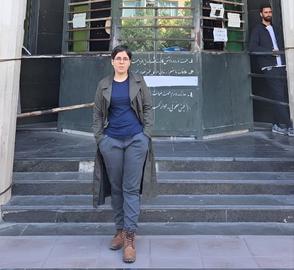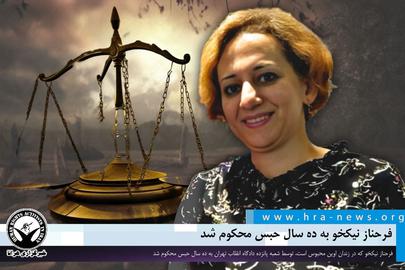She spent the early years of her life in a small, remote village in southern Iran, wondering at everything, from the rural landscape to local myths and legends passed down the generations. She began to write under a pseudonym in the 1980s, in the tense days after the Islamic Revolution, when new prohibitions and censorship cast a shadow over Iranian literary culture. But in time Moniro Ravanipour would become an internationally-acclaimed author and critic in exile.
Ravanipour was born in 1952 in Bushehr province on the northern shores of the Persian Gulf. She attended Shiraz Pahlavi University in 1972, initially studying chemistry before switching to psychology.
In 1980, when she was living in Tehran University’s dormitory, while she was studying for her master’s degree in psychology, she wrote The Sparrow and Mr. President, her first short story collection. “I remember I wrote it within two days,” she writes. “It was amid the Iranian presidential elections,” the first such elections after the 1979 revolution.” The book was immediately banned and removed from bookstore shelves. “Even I don’t have a copy myself,” she says.
In the early years after the 1979 Islamic Revolution, Ravanipour was banned from further study, while her brother was executed and her sister and husband were sentenced to death and fled Iran. While working at a factory in Tehran, Ravanipour lived under one fake name after another, before being arrested in 1983 in Shiraz during a period of mass arrests among alleged dissidents.
“I was detained for a short while, but during the first night, I was certain that they’d kill me, and no one would find out what had happened to me. I promised myself to take writing more seriously if I should ever get out. I wanted to be seen and known, so nobody could make me disappear without a trace,” she says.
From 1985 Ravanipour turned her attention back to writing. She began by working on children’s books and screenplays and later produced a parable of the Iran-Iraq war written from the perspective of a martyr’s mother. These works are known for their magic realism and for the behavioral complexity of the female characters, which critics suggest might have been influenced by her studies.
“I was the first writer who portrayed a woman running after a man in my book Gypsy by the Fire,” said Ravanipour in an interview with Voice of America. “In all the stories up until then, there were only men who ran after women.” In her 1988 short story Kanizu (Handmaiden), she speaks about forced prostitution and, in a number of other stories, she portrays the struggles of a female writer,
From 1988 onward Ravanipour published books under her real name, and her subsequent works – of which there are now 11 – garnered such critical acclaim that she was invited to speak in 21 countries, including Germany, France and the United States.
Ravanipour’s appointments abroad continued to interrupt her home life in Iran. During the presidency of Mohammad Khatami, she was invited by the Heinrich Boll Foundation to speak at the 2000 Berlin Conference about political change in Iran, alongside 16 other reformist Iranian writers and speakers. Those who attended came under fire from conservatives both inside and outside the country and, on their return to Iran, they were rounded up, interrogated and later put on trial for allegedly spreading anti-Islamic Republic propaganda. As a result of this experience, Ravanipour penned the short story collection Frankfurt Airport’s Woman.
Ravanipour was also an early supporter of the 2006 campaign for One Million Signatures for the Repeal of Discriminatory Laws, known as Change for Equality, a movement by women in Iran calling for legislative change to improve their situation. It ended with a crackdown on one of its rallies during the first year of Mahmoud Ahmadinejad’s presidency and the arrests of many of its members.
That same year, Ravanipour was offered a fellowship from Brown University in the United States and emigrated from Iran in 2007. Six months later she received another two-year fellowship from Black Mountain Institute's City of Asylum as a visiting author, at University of Nevada, Las Vegas.
Ravanipour is now 71 years old and her short stories have been translated into Arabic, English, Chinese, French, German, Kurdish, Polish, Swedish and Turkish. Her ironic and critical approach is evident in her online blogging as well as her published works.
When she was in Iran, she launched a writing workshop called The Gypsies and started another one after she moved to the US. “I started my workshops in 1993,” she says. “I had these classes once a week until I left Iran. It was halfway through when I chose the name The Gypsies. We read stories everywhere, in our homes, in parks, in coffeeshops, in bookshops…We had no fixed venue. Anybody could join our classes so long as they wrote or read stories. It was a great experience. I did the same here, but this time online. We would read stories and break them down and exchange experience.”
Her husband is Babak Takhti, son of the famous Iranian wrestling champion Gholamreza Takhti and they have named their son after his celebrated grandfather. Moniro has repeatedly said that she despises censorship and openly writes about her personal and private life, as well as her aspirations and her past, and engages with her audience on these topics. She believes that in order to fight censorship, we should begin with ourselves.
Moniro’s fight against patriarchy is not limited to her literary work and permeates her personal life as well. “In a culture where women are checked for their virginity on their wedding night, my marriage to the son of World Champion Takhti, who was 14 years younger than me, was an iconoclastic action that flew in the face of these ridiculous and antiquated traditions,” she told IranWire.
“I have seen many people hiding everything for fear of their reputation and saying nothing. On the contrary, I intend to ruin [my] reputation so that nobody will fear it,” she said in her Voice of America interview.
visit the accountability section
In this section of Iran Wire, you can contact the officials and launch your campaign for various problems

























comments